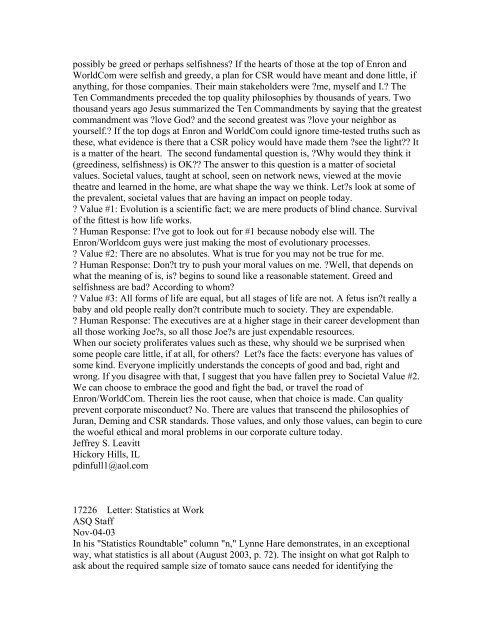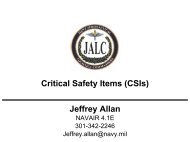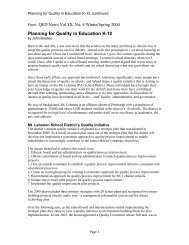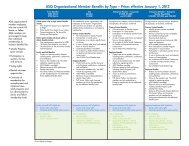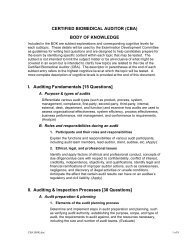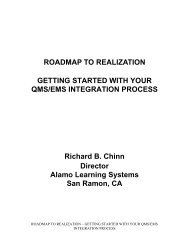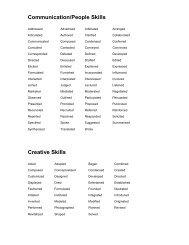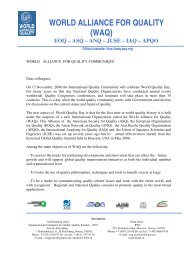Quality Progress - American Society for Quality
Quality Progress - American Society for Quality
Quality Progress - American Society for Quality
You also want an ePaper? Increase the reach of your titles
YUMPU automatically turns print PDFs into web optimized ePapers that Google loves.
possibly be greed or perhaps selfishness? If the hearts of those at the top of Enron and<br />
WorldCom were selfish and greedy, a plan <strong>for</strong> CSR would have meant and done little, if<br />
anything, <strong>for</strong> those companies. Their main stakeholders were ?me, myself and I.? The<br />
Ten Commandments preceded the top quality philosophies by thousands of years. Two<br />
thousand years ago Jesus summarized the Ten Commandments by saying that the greatest<br />
commandment was ?love God? and the second greatest was ?love your neighbor as<br />
yourself.? If the top dogs at Enron and WorldCom could ignore time-tested truths such as<br />
these, what evidence is there that a CSR policy would have made them ?see the light?? It<br />
is a matter of the heart. The second fundamental question is, ?Why would they think it<br />
(greediness, selfishness) is OK?? The answer to this question is a matter of societal<br />
values. Societal values, taught at school, seen on network news, viewed at the movie<br />
theatre and learned in the home, are what shape the way we think. Let?s look at some of<br />
the prevalent, societal values that are having an impact on people today.<br />
? Value #1: Evolution is a scientific fact; we are mere products of blind chance. Survival<br />
of the fittest is how life works.<br />
? Human Response: I?ve got to look out <strong>for</strong> #1 because nobody else will. The<br />
Enron/Worldcom guys were just making the most of evolutionary processes.<br />
? Value #2: There are no absolutes. What is true <strong>for</strong> you may not be true <strong>for</strong> me.<br />
? Human Response: Don?t try to push your moral values on me. ?Well, that depends on<br />
what the meaning of is, is? begins to sound like a reasonable statement. Greed and<br />
selfishness are bad? According to whom?<br />
? Value #3: All <strong>for</strong>ms of life are equal, but all stages of life are not. A fetus isn?t really a<br />
baby and old people really don?t contribute much to society. They are expendable.<br />
? Human Response: The executives are at a higher stage in their career development than<br />
all those working Joe?s, so all those Joe?s are just expendable resources.<br />
When our society proliferates values such as these, why should we be surprised when<br />
some people care little, if at all, <strong>for</strong> others? Let?s face the facts: everyone has values of<br />
some kind. Everyone implicitly understands the concepts of good and bad, right and<br />
wrong. If you disagree with that, I suggest that you have fallen prey to Societal Value #2.<br />
We can choose to embrace the good and fight the bad, or travel the road of<br />
Enron/WorldCom. Therein lies the root cause, when that choice is made. Can quality<br />
prevent corporate misconduct? No. There are values that transcend the philosophies of<br />
Juran, Deming and CSR standards. Those values, and only those values, can begin to cure<br />
the woeful ethical and moral problems in our corporate culture today.<br />
Jeffrey S. Leavitt<br />
Hickory Hills, IL<br />
pdinfull1@aol.com<br />
17226 Letter: Statistics at Work<br />
ASQ Staff<br />
Nov-04-03<br />
In his "Statistics Roundtable" column "n," Lynne Hare demonstrates, in an exceptional<br />
way, what statistics is all about (August 2003, p. 72). The insight on what got Ralph to<br />
ask about the required sample size of tomato sauce cans needed <strong>for</strong> identifying the


